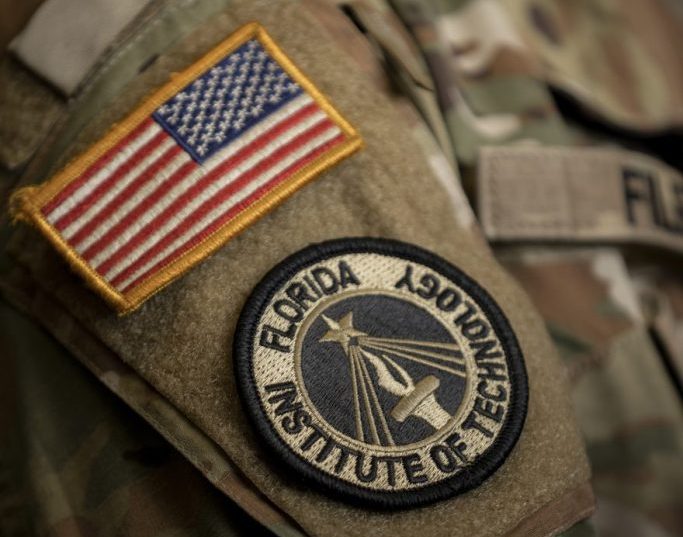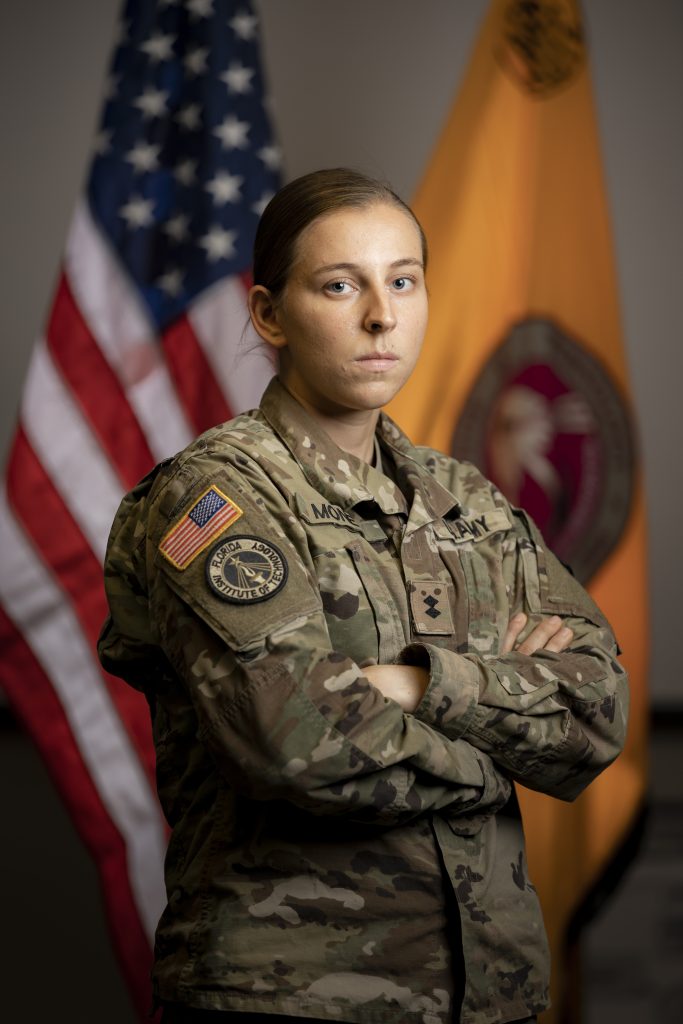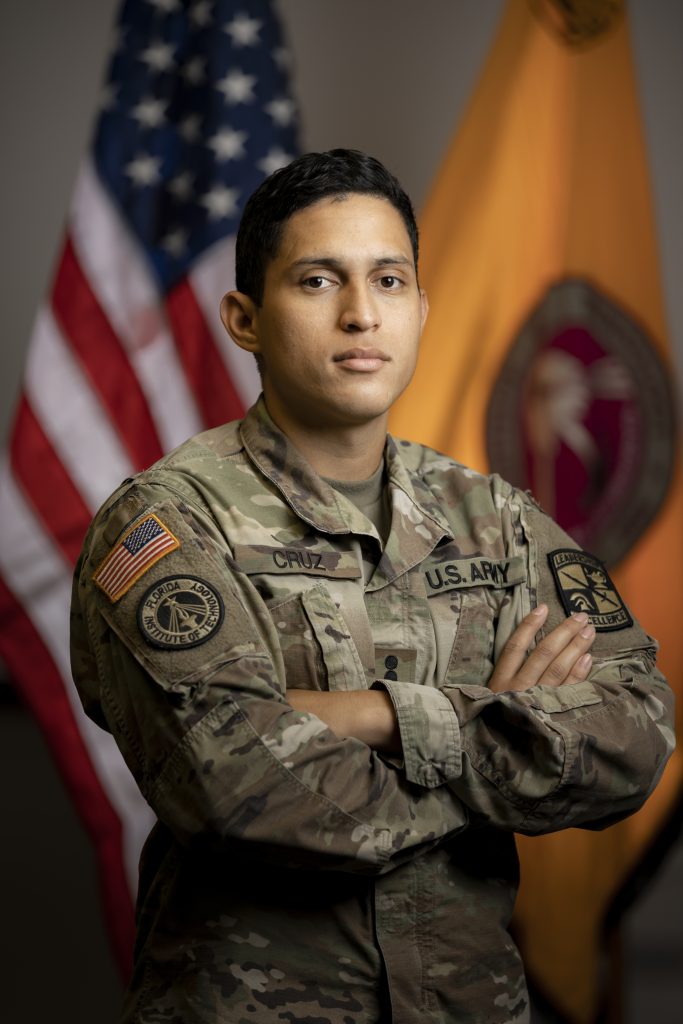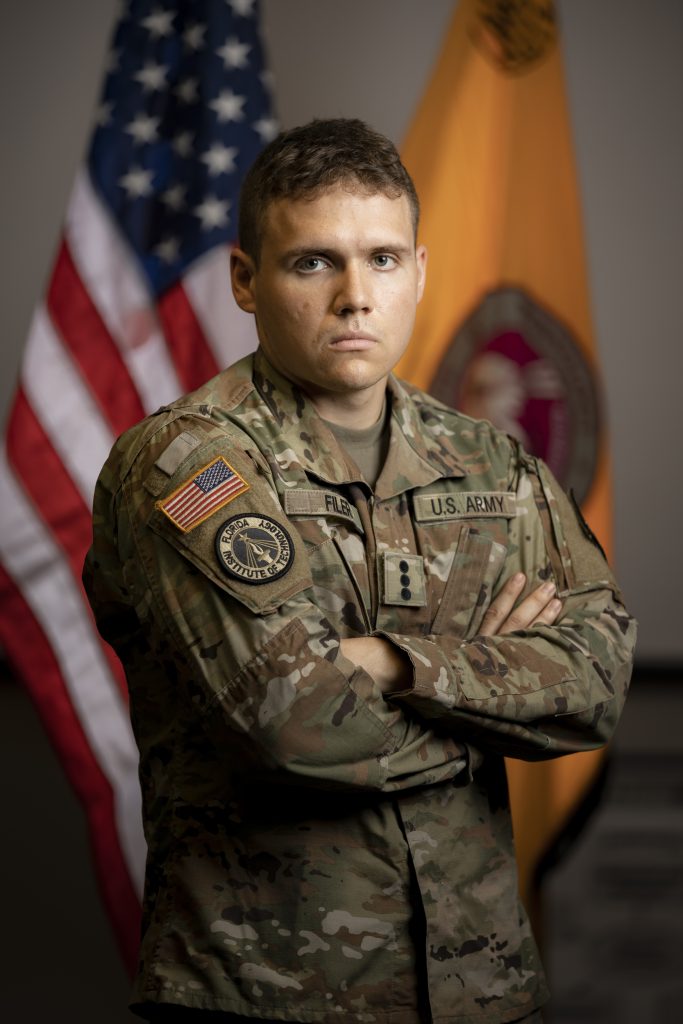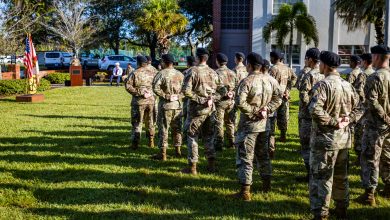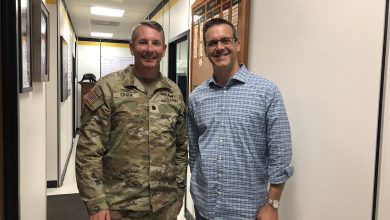Excellence Through Leadership
Panther Battalion Is A Group Of Cadets With Various Goals And Dreams, Unified By One Cause.
With their crisp uniforms and dark berets, upright posture and polite demeanor, the cadets from Florida Tech’s Army Reserve Officers’ Training Corps (ROTC) are a recognizable presence on campus. These men and women with unique goals and their own ideas on how to achieve them are united by their desire to give back, to grow into leadership, to serve.
They are part of an organization that has been a presence on Florida Tech’s campus for more than 50 years, fulfilling its mission of preparing young adults to become officers in the U.S. military. That means that even as they receive a world-class education, cadets are also involved in battle drills, shooting exercises and other training.
A closer look at the students and military leaders who bring the ROTC program to glorious, regimented life provides a snapshot of the passion, determination and commitment of all involved, and a glimpse at what makes Florida Tech such a special place.
Motivations For Joining

Kasey Money, interdisciplinary science 
Brayan Cruz, aviation management 
Jacob Filer, aeronautical science
The military has always been important to Kasey Money, a senior interdisciplinary science major. With family in the armed forces, she was inspired to follow a similar path but with the major distinction that she would be the first female service member in her family. In Florida Tech’s ROTC program, she found an ideal combination: military training and a way to get the college education she desired.
Money’s inspiration came from her family, but also from something that happened when she was just a 1-year-old girl. The attacks of Sept. 11, 2001, had a profound impact on her future. As she grew older and saw footage of the smoldering ruins and images of military deployments in response, she was—and continues to be—inspired to do her part.
She plans to work in military intelligence. Money talked about her experience at an ROTC ceremony on campus marking the 20th anniversary of 9/11.
“That is probably one of the more emotional moments I’ve had, just because 9/11, truthfully, is the biggest factor in me joining the military,” she says. “To be there on the brink of commissioning, but to be able to address other military people who deployed as a result of that, it kind of felt like I was coming full circle.”
Brayan Cruz, a junior majoring in aviation management, moved to Florida from his native Honduras in 2012 at the age of 15. Living in the U.S. and enjoying the opportunities that provided, Cruz saw military service as a way to give back to a country that has given so much to him.
In 2016, he joined the National Guard, and when he came to Florida Tech in 2019, he promptly joined the ROTC. Doing so was a way to switch to the officer side, and he has two possible paths: continuing to work in the military logistics field or becoming a commercial pilot after getting flight time through the military.
“So far, it’s been an extremely pleasant experience. I am very proud to be a Panther,” Cruz says.
Aeronautical science major Jacob Filer was an active-duty member of the U.S. Army, serving as an aircraft avionics technician during his three-year enlistment. Filer came to Florida Tech last year, wanting to get a college degree to help achieve his goal of becoming a commercial pilot.
“My first thought was to go to ROTC because I get the college experience; I get the military aspect with it. So I decided, ‘Why not do it?’” he says.
Inspired By Leaders To Become Leaders
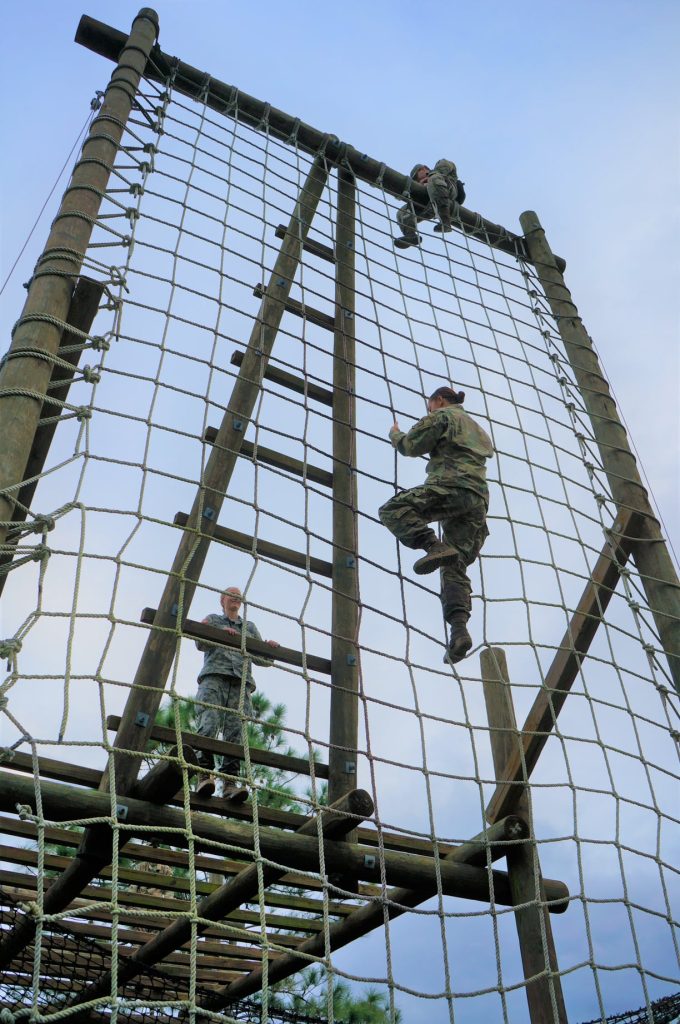
The 52 cadets comprising Panther Battalion are supported by a strong leadership group. In the same way military personnel would be assigned to a base, there are four active-duty Army personnel assigned to the Florida Tech ROTC: Lt. Col. James Crook, military science professor; Capt. Pat Willis, military science assistant professor; Sgt. 1st Class Michael Johnson, military science instructor; and Master Sgt. Alan Roche, senior military instructor.
Crook has been in the Army since 1993 and with Florida Tech ROTC for two years. He served in U.S. Army NATO, 82nd Airborne Division, 160th Special Operations Aviation Regiment and the Army Special Operations Command. As a congressional fellow, he served on Capitol Hill for the chair of the Tactical Air and Land Subcommittee and as the legislative assistant to the secretary of the army. He has deployed multiple times in support of combat operations to both Iraq and Afghanistan.
Working with the cadets of Panther Battalion inspires Crook, who is nearing the end of his career. As cadets navigate both ROTC programs on campus and off-site initiatives, such as airborne school, Crook’s goal is to help them become decision-makers and critical thinkers.
“That can be on the battlefield; that can be whether they study for a test or not. Everything in leadership is about decisions—assuming risk and making decisions,” he says. “So, I want them to be able to calculate risk and make decisions off that risk.”
Roche, a member of the U.S. Army Special Forces who has been in the military since 2004, is the newest member of the ROTC program. He says the opportunity to work with the next generation of military leaders and to see them progress and achieve success is a highlight.
“Mentoring is something I’ve enjoyed. I’ve always taken a lot of pride in my ability to do it,” Roche says. “Now, getting to see the amount of future soldiers I’m going to be able to reach out and touch through supporting the current students and what they’re going to do in the future, that’s a high point for me, knowing the lasting effects that my work and this position will hold.”
The leadership instilled by Crook, Roche and others can be seen in the cadets.
Money earned the title of battalion commander. In that role, she has worked to bring change. Last semester, the organization founded a women’s mentorship program through which female cadets gather to discuss the challenges they face, as well as the strengths they have in leadership.
“I feel like, as females, we have a natural tendency to want to take care of people, and that’s absolutely an important part of leadership,” Money says. “However, we also have to sometimes almost prove that we’re worthy of that position, whereas I feel like male counterparts are just assumed to be worthy. But I think in the military, and definitely in this program, you’re definitely looked at more by your character and your ability to do the job than you are by your gender.”
ROTC does a good job of preparing cadets by instilling confidence in them, allowing them to complete the tasks needed and to interact in team settings, notes Cruz, who serves as officer-in-charge of the program’s color guard.
“I think the ROTC program prepares us by giving us different leadership positions throughout the battalion to get an idea of how to lead different groups of individuals,” he says.
Growing Through Initiatives
In addition to leadership development unfolding on and around campus for Panther Battalion, cadets also participate in a host of Army training initiatives.
After COVID-19 altered 2020’s ROTC schedule, 18 cadets trained at Fort Knox’s advanced camp this summer. Cadets from 39 ROTC programs worked for the Recondo (short for “reconnaissance commando”) badge, awarded to cadets who exceed standards in the Army physical fitness test, confidence courses, land navigation, marksmanship, first aid, the 12-mile foot march and in chemical, biological, radiological and nuclear (CBRN) exercises. Of the 39 programs, Florida Tech cadets earned the highest percentage of Recondos with seven, the best performance in the 6th ROTC Brigade.
Money went to the famed military academy at West Point for ROTC training, interacting with West Point cadets and working in their environment. She also participated in the Project GO language immersion program that offers qualified ROTC students fully funded opportunities in critical language education, overseas study and cross-cultural experience.
Money had taken Chinese while on campus, allowing her to do the study abroad program in Taiwan and obtain a wealth of international experience.
“It was fun. I feel like I learned a lot really fast,” she says of her Taiwan trip. “A lot of times, I was outside of my comfort zone, especially when communicating with local people, but it was so incredible to see how other people live and also to have that experience while I’m young—to be thrown into another culture and being forced to adapt.”
The mission of the Army ROTC is to produce future officers for the U.S. Army. With the help of key leadership, cadets are getting a valuable, multifaceted education that will equip them to achieve their goals while learning leadership traits that will help them be successful in the armed forces and beyond. That matters to Crook.
“It’s extremely rewarding, I value what they do, and I know they are volunteering during an extremely difficult time for our country, for our military,” he says. “To have them to raise their right hand and protect and defend this country is extremely humbling.”
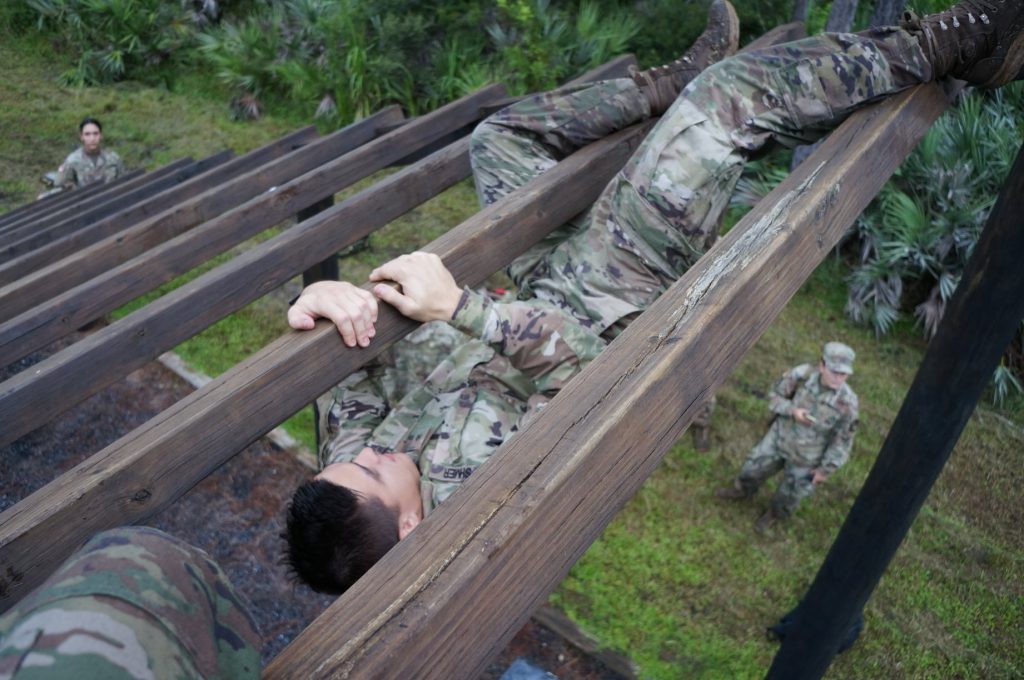
This piece was featured in the fall 2021 edition of Florida Tech Magazine.

